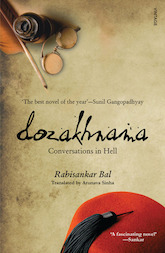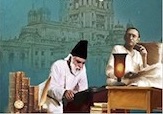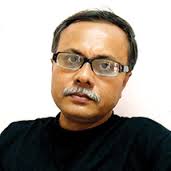
Paperback: 544 pages
Publisher: Vintage Books (2012)
Language: English
« Excerpts »
UK:
|
When Christopher Marlowe’s Dr. Faustus makes a pact with Mephistopheles (spirit of the Devil) and willingly trades his soul in search of supreme knowledge and power that extend beyond the world of mortality; he does not realise he is walking the road to hell. A German scholar who believed he has reached the end of every subject, Faustus is taken over by an overreaching ambition that ultimately drives him to eternal damnation. But why this unrelenting quest for knowledge had to meet such a punishment or was it Faustus’ greed and hubris that consumed his all?
 Unlike Faustus who designed his own route to hell and was silenced forever, there were two writers (born in two different centuries) who revisited their lives and found their lost voices from within the contours of their respective graves. When two literary giants- Mirza Ghalib, the quintessential classical Urdu and Persian poet of the Mughal era and Saadat Hasan Manto, a controversial short story writer of the 20th Century start a conversation, what follows is an unfolding of a history of a country that has withstood all seasons of change, years of colonial rule, partition and war, several months of captivity and countless days of poverty. Unlike Faustus who designed his own route to hell and was silenced forever, there were two writers (born in two different centuries) who revisited their lives and found their lost voices from within the contours of their respective graves. When two literary giants- Mirza Ghalib, the quintessential classical Urdu and Persian poet of the Mughal era and Saadat Hasan Manto, a controversial short story writer of the 20th Century start a conversation, what follows is an unfolding of a history of a country that has withstood all seasons of change, years of colonial rule, partition and war, several months of captivity and countless days of poverty.
Rabisankar Bal’s novel ‘Dozakhnama: Conversations in Hell’ re-imagines the ‘dozakh’ (hell) not as a prison cell everyone dreads to live in but a liberating space that allows an undeterred flow of free thoughts sans fear of censorship or condemnation.
An abandoned manuscript, an untold story
In Lucknow to research on courtesans (tawaifs) of the city, a journalist (also the narrator of the story) meets Farid mian, a once upon a time writer and now a ‘madman’ chased by ‘shadows of people’ talking to him. Farid mian hands over an unpublished manuscript he had guarded for years to the journalist, requesting him to get it published and, thus, relieve him of the story, a burden he no longer can bear. The novel, as Farid claims was written by Manto on Mirza Ghalib, “Manto sahib used to dream of writing a novel about Mirza Ghalib.” The manuscript is written in Urdu and the narrator, to whom the script is not known, admires the calligraphy of the written word for long as he carefully turns its crumbling pages. He returns to Calcutta with the manuscript and arranges for an Urdu teacher who first agrees to teach him the language but later, on his suggestion, reads out the story to him while he writes it down like a dutiful scribe. The veracity of the novel stands questioned in the introduction chapter itself that ends with Manto’s signature dated January 18, 1955; the very date Manto died on. Names do not really matter; stories are what travel for ages across generations, and with this spirit in mind, the reader is slowly drawn into the wonderfully woven world of the two most loved writers.
The realm of imagination is a literary tool that the author uses to bring together two geniuses who lived in tough times of turmoil and violence. The revolt of 1857 marked an end to the culture of story-telling and the ‘dastangos’ (storytellers) who once earned their living thanks to their bags full of stories, were suddenly lost. The corridors of Jama Masjid no longer echoed the voice of the dastangos but the courtyards of the mosque stood desolate in ‘Englishman’s Dilli’. Relegated to his diwankhana, Ghalib had no option but to embrace solitude and be caged by thoughts that often translated into soulful couplets and poems. Shifting sides in his grave, Mirza pours his heart out to Manto and says if home was a cell, then marriage imprisoned him again at the age of 13. All kinds of ridicule and humiliation that Ghalib faced in royal courts, his apathy in writing volumes of history of the Mughals under the reign of Bahadur Shah Zafar and his perennial financial struggle to sustain a family on a meagre pension contribute to his account of miseries.
Dastaan that lives on…
As opposed to Ghalib whose life reads like a journey that had nothing to offer him except void and emptiness, Manto’s biography is far from being lacklustre. A lot has been said about Manto the writer, who spent almost half his life doing the rounds of courts for his ‘obscene’ short stories but little have we unearthed the man beneath the author. He was a doting father who absolutely loved his three daughters. The one thing that created a rift between his family and him was alcohol and his complete submission to it. Such was his addiction that he once spent all his money to buy liquor instead of medicines for his ailing daughter. As Ghalib listens intently to Manto’s revelations on his relationship with Ismat Chughtai, a contemporary Urdu writer, the much carried away readers are forced to come back from the fictional world that at times begins to resemble the real. The author intelligently resurfaces the narrator at junctures when the respective biographies of the writers have transcended all boundaries of facts and fiction. The reader might be overwhelmed by the sheer volume of stories and ‘qissas’ that these two stalwarts’ hearts are brimming over with and therefore, like turning off the water tap, the author brings back the narrator and the Urdu teacher as breathers and not uncalled for interruptions.
‘Dozakh’- A metaphor
This novel is like a surprise gift to the many fans of Ghalib and Manto who wouldn’t mind reading about them in the first person voice and that too with the knowledge of the truth. As the narrator explains, “…if we’re all someone else’s dream, then a Manto from a dream could well have written a novel about Ghalib from another dream”.
The book is not just about conversations in hell. The stories that Mirza and Manto exchange with each other from their graves in Delhi and Lahore respectively are also lamentations of two authors who witnessed the end of the world almost everyday of their lives. ‘Dozakh’ is a metaphor that in a way summarises what their lives in reality were like. As much as this novel reads like a dream sequence, it also brings forth those historical realities that we want to forget as a nightmare but unfortunately can’t get rid of.
9 Dec 2014 | Times of India
 Rabisankar Bal Rabisankar Bal
Born in 1962, Rabisankar Bal is a bengali novelist and short story writer, credited with over fifteen novels. He has been writing for over thirty years. Apart from being a writer, he pursues journalism. He zealously follows literature, painting, and also world cinema.
|


 Unlike Faustus who designed his own route to hell and was silenced forever, there were two writers (born in two different centuries) who revisited their lives and found their lost voices from within the contours of their respective graves. When two literary giants- Mirza Ghalib, the quintessential classical Urdu and Persian poet of the Mughal era and Saadat Hasan Manto, a controversial short story writer of the 20th Century start a conversation, what follows is an unfolding of a history of a country that has withstood all seasons of change, years of colonial rule, partition and war, several months of captivity and countless days of poverty.
Unlike Faustus who designed his own route to hell and was silenced forever, there were two writers (born in two different centuries) who revisited their lives and found their lost voices from within the contours of their respective graves. When two literary giants- Mirza Ghalib, the quintessential classical Urdu and Persian poet of the Mughal era and Saadat Hasan Manto, a controversial short story writer of the 20th Century start a conversation, what follows is an unfolding of a history of a country that has withstood all seasons of change, years of colonial rule, partition and war, several months of captivity and countless days of poverty. Rabisankar Bal
Rabisankar Bal